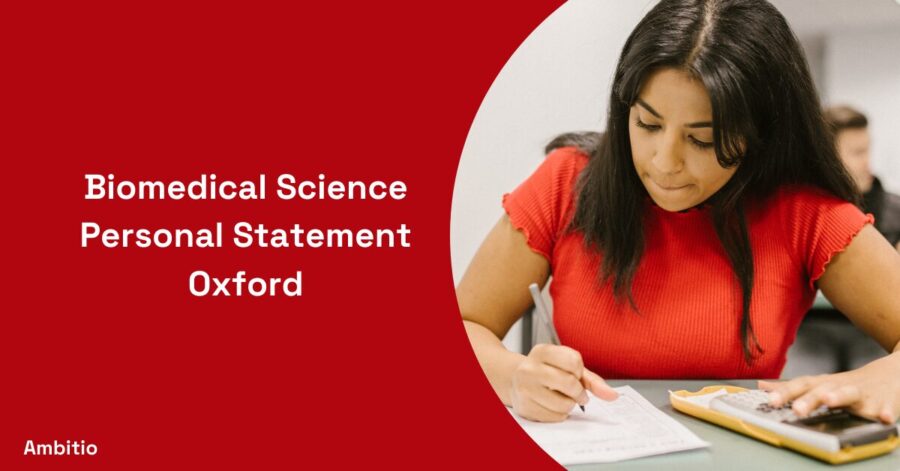27 February 2025
5 minutes read
Biomedical Science Personal Statement Oxford: Perfect Biomedical Personal Statement Example

Key Takeaways
- A Biomedical Science personal statement Oxford must demonstrate academic excellence, research experience, and a strong passion for scientific discovery.
- Your Biomedical Science personal statement for Oxford should emphasize strengths in genetics, molecular biology, and biomedicine, aligning with Oxford’s high standards.
- A well-crafted Biomedical Science personal statement for Oxford should showcase hands-on lab experience, critical thinking skills, and motivation for medical research.
Your personal statement is your time to shine when you’re applying for the best universities such as the university of Oxford for a biomedical science degree. Writing a good biomedical science personal statement can prove difficult, but with the correct help, you can be different.
In this in-depth guide, we’ll discuss the essential components of an effective personal statement, give examples, and offer useful tips to assist you in your application.
What Is a Biomedical Science Personal Statement?
Your biomedical science personal statement is an important component of your UCAS application to Oxford University. It’s an opportunity to express your interest in biomedical science, your fit for the program, and your passion for studying the intricacies of the human body.

Admissions tutors are looking for evidence of intellectual curiosity and commitment to the discipline.
How to Write Your Biomedical Science Personal Statement and How to Highlight Your Passion for Biomedical Science?
A Biomedical Science personal statement should reflect your passion for science, highlight biochemistry knowledge, and align with Oxford Biomedical and Medical Sciences Division standards. When writing your personal statement, use real personal experiences to stand out, just like insights shared on Student Room.
1. Start with a Strong Opening
Your introduction should be engaging. You could include a personal experience or something that sparked your interest in biomedical science. For instance:
2. Emphasize Your Academic Success
Write about your academic background, A-levels, course work, or any summer school you may have done. Stress your interest in biology and chemistry, and how these topics have led you to study biomedical sciences at Oxford.
3. Display Your Curiosity and Passion
Tell us about examples where your intellectual curiosity led you to learn beyond the typical syllabus. Describe any EPQ (Extended Project Qualification) you completed or books, podcasts, or documentaries about biomedical science that you’ve read/listened to/seen.
4. Show Your Skills
Talk about your teamwork skills, problem-solving skills, and time management. Demonstrate how you have worked in a harmonious way in different mechanisms, either in the lab or in roles of responsibility, e.g., prefect or mentor.
5. Refer to Relevant Experiences
If you have had the chance to shadow a biomedical scientist or undertaken projects involving the subject, mention it. Explain what you have learned and how they have impacted your choice to study for a biomedical sciences and neuroscience degree.
Biomedical Science Personal Statement Examples
Writing a good personal statement is not always easy, but it is made simpler when you see examples to learn from.

Here are a few examples of actual biomedical science personal statements with notes on what to emphasize in a winning application.
1. Passion for Patient Care
“My journey into the world of biomedical science began during my high school years when a family member was diagnosed with a rare genetic disorder. Witnessing their struggle ignited a passion within me to pursue a career that would allow me to contribute to the diagnosis and treatment of such conditions.
By challenging coursework and extracurricular service at a community clinic, I have recognised that biomedical science is the common ground linking biology and the potential to impact patients’ lives in a real way.”
This instance illustrates how individual experiences inform one’s passion for biomedical science as it highlights the aspiration to make a direct contribution to patient care.
2. Research Enthusiasm
“Throughout my A-level, I completed a project researching the possible applications of CRISPR-Cas9 gene editing in the treatment of genetic disorders. The thrill of performing experiments and interpreting data led me to believe that I had a calling in biomedical science. I would love to further explore the field of genetics and make contributions to pioneering research that can transform healthcare.”
This is an excellent example of enthusiasm for research as well as demonstrating how their scholarship has motivated them to become a professional in biomedical science.
3. Interdisciplinary Interest
“What is most interesting in biomedical science for me is its interdisciplinary approach. It integrates bits of biology, chemistry, and medicine to unscramble the puzzles and complexity of the human body.”.
My interest in this area has been further kindled by my participation in a summer school program, during which I got to work with students from different backgrounds. This experience reaffirmed for me that the solution to intricate healthcare problems lies in an interdisciplinary approach.
This illustration highlights the nature of biomedical science and how working with fellow students from different disciplines can better equip one’s knowledge and abilities.
Top 10 Foreign Universities Other than Oxford for Biomedical Science
A course in biomedicine at a leading university offers a solid background in fundamental cell biology, genetics and molecular biology, and human body functions.
If you’re pursuing biology and seeking the highest degree course, the following are the top 10 universities globally for Biomedical Science.
| Rank | University | Country | Estimated Tuition Fees (Annual) | Average Graduate Salary (Annual) |
|---|---|---|---|---|
| 1 | Harvard University | USA | $55,000 – $65,000 | $120,000 |
| 2 | Stanford University | USA | $56,000 – $68,000 | $125,000 |
| 3 | University of Cambridge | UK | £36,000 – £45,000 | £60,000 |
| 4 | Imperial College London | UK | £32,000 – £40,000 | £55,000 |
| 5 | University of Toronto | Canada | CAD 45,000 – CAD 55,000 | CAD 85,000 |
| 6 | University of British Columbia | Canada | CAD 40,000 – CAD 50,000 | CAD 80,000 |
| 7 | University of Melbourne | Australia | AUD 45,000 – AUD 55,000 | AUD 90,000 |
| 8 | University of Sydney | Australia | AUD 48,000 – AUD 58,000 | AUD 85,000 |
| 9 | Johns Hopkins University | USA | $54,000 – $66,000 | $115,000 |
| 10 | University of Edinburgh | UK | £30,000 – £38,000 | £50,000 |
Conclusion
Writing a memorable biomedical science personal statement for Oxford takes time, dedication, and an authentic interest in the field. Make sure you personalize your statement to show your individual experiences and goals. By doing it right, you can improve your prospects of getting accepted into one of the world’s best universities for biomedical sciences. Good luck!
All set to study abroad? Join Ambitio Pro and schedule a call with our experts now to make your dreams come true!
FAQs
What should I include in my Biomedical Science personal statement Oxford?
Your statement should highlight academic excellence, research experience, lab skills, and a passion for biomedical science, aligning with Oxford’s rigorous standards.
How do I demonstrate my passion for Biomedical Science in my Oxford personal statement?
Discuss hands-on lab experience, scientific projects, relevant coursework, and independent research to show a strong commitment to the subject.
Does Oxford look for specific subjects in a Biomedical Science personal statement?
Yes, Oxford values strengths in biology, chemistry, genetics, molecular biology, and biomedicine, along with problem-solving and analytical skills.
How important is work experience for a Biomedical Science personal statement for Oxford?
While not mandatory, relevant lab work, research placements, or medical internships can strengthen your statement and demonstrate practical knowledge.
How should I structure my Biomedical Science personal statement for Oxford?
Start with a compelling introduction, followed by academic achievements, research experience, extracurricular activities, and conclude with future aspirations.
What makes a Biomedical Science personal statement stand out for Oxford?
A unique and well-structured statement that showcases intellectual curiosity, analytical thinking, and a deep understanding of biomedical research will stand out.
How long should my Biomedical Science personal statement for Oxford be?
It must fit within UCAS’s 4,000-character limit (around 47 lines) while maintaining clarity, conciseness, and a compelling narrative.

You can study at top universities worldwide!
Get expert tips and tricks to get into top universities with a free expert session.
Book Your Free 30-Minute Session Now! Book a call now




























